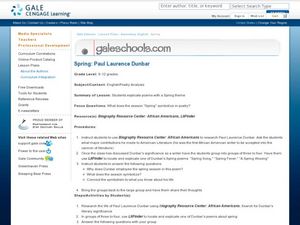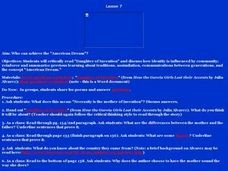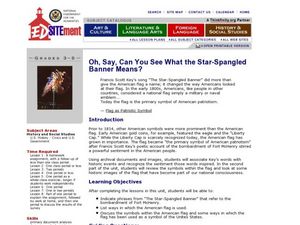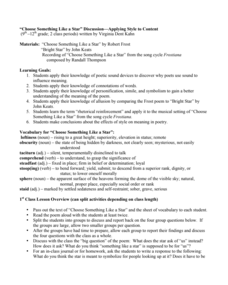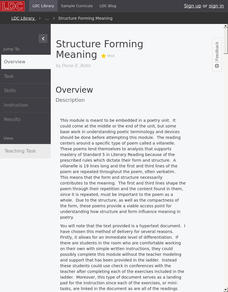Curated OER
Spring: Paul Laurence Dunbar
Explore the abundance of spring, no matter what season you are covering in your class! Using the poetry of Paul Laurence Dunbar, GALE Biography Resource Center, and Litfinder, pupils work on researching the poet and analyzing the use of...
Curated OER
Prairie Poetry
Ninth graders take note of the ways in which word choice, rhythm, language and narrative voice, as well as point of view in a poem can be used to evoke a time and place. They use their insights to create a poem of their own.
Curated OER
Plot the Oysters' Peril!
Use comic strips to teach sequencing in narrative poetry. As homework, each class member selects a comic strip with 4-8 frames, cuts the frames apart, places the pieces in an envelope, and brings the envelope to class. Class members swap...
Curated OER
Metaphor
High schoolers identify the distinction between literal and figurative language with a focus on metaphors. They complete a metaphor analysis chart, then practice expanding metaphors by composing their own comparisons of elements of the...
Curated OER
Who Can Achieve the "American Dream"
Exploring the idea of working to achieve the American Dream, the class reads an excerpt from How the Garcia Girls Lost their Accents by Julia Alvarez. Following, the class analyzes the excerpt and discusses the theme of the reading using...
Denver Art Museum
Putting Images into Words
Engage your class in art analysis of Indian Look-Alike by Melanie Yazzie. Using this work of art as inspiration, writers compose a poem or short story. After a peer review session, the teacher conveys information about the work of art as...
Curated OER
The Poetics of Hip Hop
The Bard, Nikki Giovanni, Mos Def? “Sonnet 18,” Ego Tripping,” and “Black on Both Sides”? Sure! It’s the poetics. Class members compare the lyrics, rhythm, and rhyme in classic poetry to hip-hop in a richly detailed resource that...
Curated OER
Producing Beats
Turn your classroom into a music studio as groups work together to determine why music sounds different when performed live versus a recording. After listening to some different music, each group picks a poem, creates a recording, and...
Curated OER
Oh, Say, Can You See What the Star-Spangled Banner Means?
Students research the historical inspiration for the lyrics of the "The Star Spangled Banner". They explore websites, read articles and analyze poetry in an examination of America's patriotic symbols and history.
Curated OER
Poetic Elements Are Fun!
Engage your class in the elements of poetry with a series of lessons and activities. The plans cover simile, metaphor, personification, onomatopoeia, alliteration, and imagery. Learners come up their their own metaphors, identify poetic...
Curated OER
Performance-Based Assessment Practice Test (Grade 4 ELA/Literacy)
Track the progress of your fourth graders' reading and writing skills with this practice Common Core assessment. Based on a collection of six reading passages that include narrative stories, poetry, and a series of informational...
Oklahoma City of Museum Art
Harlem Renaissance
Individuals expressed the Harlem Renaissance in diverse forms of art, ranging from poetry to photography to painting. Learners explore pieces using a carefully curated collection from the Oklahoma City Museum of Art. Included lessons ask...
EngageNY
Grade 11 ELA Module 2: Unit 2, Lesson 9
How do authors employ specific word choices to describe complex relationships? Scholars read and analyze the first stanza from Audre Lorde's contemporary poem "From the House of Yemanjá." Pupils determine the meanings of figurative and...
EngageNY
Looking Closely at Stanza 1—Identifying Rules to Live By Communicated in “If”
Here is a lesson plan in which pupils connect themes and rules to live by from the story Bud, Not Buddy by Christopher Paul Curtis to those found in the poem If by Rudyard Kipling. First, scholars discuss their reading and review Bud's...
EngageNY
Introducing “If” and Noting Notices and Wonders of the First Stanza
After reading chapter 14 of the story Bud, Not Buddy by Christopher Paul Curtis, scholars take part in a read-aloud of the poem If by Rudyard Kipling and compare it to the reading of Bud, Not Buddy. Learners then go deeper into the poem...
National Gallery of Art
The First African American Regiment
Young historians examine a memorial sculpture of the first African American regiment in the Civil War, and then compare how the experiences of the regiment are portrayed in letters and poetry, as well as in the motion picture, Glory.
K12 Reader
Different Perspectives: The American Revolution
Prompt your young historians to hone in their reading comprehension skills by considering the fascinating perspective that Rudyard Kipling offers in his poem, "The American Rebellion", which provides an alternative perspective toward the...
EngageNY
Grade 11 ELA Module 2: Unit 2, Lesson 10
Audre Lorde's poem "From the House of Yemanjá" describes the speaker carrying two women on her back—she must be strong! Pupils read the second stanza using instructional activity 10 of 14 from the Grade 11 ELA Module 2: Unit 2 series....
Facing History and Ourselves
Responding to Difference in Democracy
Disagreements happen in a diverse democracy. It's what people do about these differences in a diverse society that the resource models. After listening to an eight-minute podcast about a woman who collaborated with people who have very...
Academy of American Poets
The Immigrant Experience
The Buttonhook by Mary Jo Salter is the focus of a unit that explores the immigration experience to Ellis Island. First, scholars bring in an artifact that represents their heritage. A group-exercise allows them to share and discuss...
Read Works
A Bird Came Down the Walk
"A Bird Came Down the Walk" by Emily Dickinson is the focus text of a narrative poetry-based reading comprehension worksheet. After reading her poem, young readers respond to seven multiple choice and three short answer questions. The...
Robert Frost Farm
“Choose Something Like a Star” Discussion—Applying Style to Content
Robert Frost's "Choose Something Like a Star" and John Keats' "Bright Star" provide the text for a two-part instructional activity in which class members analyze the effects of style on meaning in poetry. Randall Thompson's song cycle...
Literacy Design Collaborative
Structure Forming Meaning
Teach literary lovers how to form opinions about form. Scholars read
informational text about the form used in villanelles. After analyzing
the structure used in the poetry with graphic organizers and gallery
walks, writers create...
Texas Education Agency (TEA)
Annotate and Analyze a Paired Passage: Practice 1 (English II Reading)
What do a colt and a boy in a tree have in common? More than might be first apparent. The fourth interactive in a series of ten introduces readers to intertextuality, the process of using abstract thinking to consider how one text...


